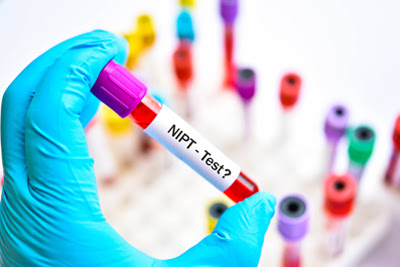NIFTY (Non-invasive Fetal Trisomy Test) is a non-invasive prenatal test used to diagnose fetal trisomy. This test is based on the study of cell-free fetal DNA (cffDNA) present in the plasma and serum of a pregnant woman. NIFTY detects fetal trisomy of chromosomes 13, 18, 21, X, Y, and X monosomy. Abnormal NIFTY is verified using other diagnostic techniques. However, the sensitivity of NIFTY for trisomy 21, 18, and 13 is estimated at 99%, 97%, and 79%, respectively, with the false-positive rate for all examined trisomy and X monosomy of < 1%.
In 2010, the NIFTY Test (Non-Invasive Fetal TrisomY test) became the first NIPT to enter clinical testing. A study on nearly 147,000 pregnancies was conducted to validate this test. Based on the observations till 2019, there have been over 6,000,000 NIFTY tests worldwide. NIFTY is used to screen some of the most common trisomies present at the time of birth, including trisomy 21 (Down Syndrome), trisomy 18 (Edwards Syndrome), and trisomy 13 (Patau Syndrome). NIFTY also provides a scope for testing sex chromosomal aneuploidies, chromosomal deletions/duplications, and gender.
The Process
Cell-free DNA (cfDNA) are short fragments of DNA found in the blood. These cfDNA fragments from the fetus pass into the mother’s bloodstream via the placenta during pregnancy. The NIFTY test helps detect chromosomal abnormalities in the fetus’s DNA by testing the blood sample from the mother. The DNA samples of the fetus and mother are analyzed using sequencing technologies. The complete genome is sequenced and compared against the optimal reference chromosomes to identify genetic abnormalities. By using this methodology, the NIFTY test gives an accurate result. It leads to screening a broader range of irregularities, including trisomies, sex chromosomal aneuploidies, and deletion/duplication syndromes.
Several prenatal screening options are available. However, these traditional screening methods have very low accuracy and high false-positive rates than NIFTY. Some invasive diagnostic tests, such as amniocentesis or chorionic villus sampling (CVS), show accuracy but carry a 1 – 2% risk of miscarriage. NIFTY is a non-invasive testing method performed solely from a maternal blood sample. Hence, it has no threat to the mother or fetus.
Features
- NIFTY is Safe – It carries no risk of miscarriage
- Early Diagnosis– screening possible from week 10 of pregnancy
- Fast Results – You can get your test results in less than seven working days
- Accuracy– over 99% sensitivity for trisomy conditions 21, 18 and 13
- Trusted and Useful– over 6,000,000 samples were processed worldwide and validated on a study of over 147,000 pregnancies.
This method is beneficial to detect the baby’s chromosomal abnormalities as these lead to stillbirth and malformations in the baby.
What does the test find?
- Down’s Syndrome (Trisomy 21), Edwards Syndrome (Trisomy 18), Patau syndrome (Trisomy 13), Trisomy 9, Trisomy 16 & Trisomy 22
- Gender Identification – This is optional. A gender identification test will be conducted only if the parents require that.
- Sex Chromosome Aneuploidies – NIFTY identifies Turner syndrome (Monosomy X), Klinefelter syndrome (XXY), Triple X syndrome (XXX), and Jacobs syndrome (XYY)
- Up to 84 Microdeletion/Microduplication Syndromes, including Cri du Chat (5p deletion) Syndrome, DiGeorge Type 2 Syndrome, Cat-eye Syndrome, Angelman Syndrome/Prader-Willi, and Jacobsen Syndrome.
Pre-Requisites
You must consult a qualified doctor/ healthcare professional; before undertaking any non-invasive prenatal testing. This is to understand the risks, make necessary diagnoses, take treatment, or find any other potentially relevant healthcare issues.
Who SHOULD NOT take the test?
- Patients with maternal, fetal, and placental mosaicism should not undergo the NIFTY test. Mosaicism is the presence of mixtures of chromosomally normal and abnormal cells in the pregnancy.
- Maternal or paternal chromosomal translocation/inversion
- Those who received a blood transfusion within a year before the date of the NIFTY Test cannot undergo the test.
- Patients who had transplant surgery or stem cell therapy
- Patients who have the vanishing twin syndrome
Non-invasive tests are getting popular, especially with the spread of the novel coronavirus. As medical technology advances every day, prenatal tests and pregnancy care are evolving. Approach a certified medical professional, seek advice, gather information, and do the most appropriate tests.

